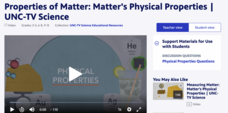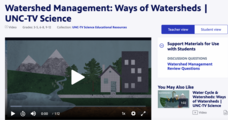PBS
Stop and Animate
Get animated about animations. Future engineers learn about stop-motion animation using an app. Working in groups, they make their own animations where they have figurines move to music.
PBS
Signal Senders
Send a signal to let others know one's location. Scholars investigate how scientists track the movement of marine wildlife. They model the process by creating a custom sound that can be used to identify each group member as they walk by.
PBS
Robot Body Language
Don't be so emotional! Scholars take part in an activity where they consider how future robots will be able to show emotions. They place paper bags over their heads, act out emotions through body movements, and have others guess the...
PBS
Passion for Pixels
Picture this: a fun activity for pupils to discover pixels. After learning about digital signals and pixels, scholars act as senders and receivers of an image. The sender indicates zero or one to tell whether each square in a grid is...
PBS
Locker Lights
Light up a locker for a more festive hallway! Scholars learn about electric currents, LEDs, and switches, then experiment with their own circuits. They use the circuits to design and build locker decorations that light up when turned on...
PBS
Properties of Matter: Matter's Physical Properties | UNC-TV Science
Does gold really boil? Learn what temperature gold boils at and more using an animated activity about the properties of matter. Scientists learn about the properties of matter including examples of physical properties, the effect changes...
PBS
Phase Changes | Phases of Matter | UNC-TV Science
Take an energetic ride through the phase changes of a water molecule in a compact activity. Young scientists learn about the phases of matter and discover the role of thermal energy in governing phase changes while watching a short...
PBS
The 3 Phases | Phases of Matter | UNC-TV Science
Explore the states of matter without the mess or expensive equipment in a compact, informative activity. Scientists watch as the narrator explains the three states of matter using a glass of ice and soda in an animated video that...
PBS
Watershed Management: Ways of Watersheds | UNC-TV Science
Inspire young conservationists to protect the environment with a short activity on water quality and watersheds. Participants discover the importance of watershed management, learn about water quality problems, and discover possible...
PBS
The Water Cycle: Ways of Watersheds | UNC-TV
Explore water on Earth without getting wet using a short animated activity. Scientists learn how water interacts with the land, the importance of watersheds, and relevant vocabulary as they watch an informative and engaging video....
Health Smart Virginia
Happiness
There's power in a flower. After taking a happiness survey and watching a PowerPoint about the habits of happy people, pupils decorate a paper flower with six positive affirmation statements that they feel they can benefit from reading...
Health Smart Virginia
Mental and Emotional Health
Working in groups, sixth-graders identify internal factors that negatively impact them. Then, explain how they could change that factor into a positive influence. Finally, individuals create personal mind maps that identify their...
Health Smart Virginia
Wrinkled Heart
Contrary to the old saying, words, like sticks, can hurt. That's the central idea in a lesson about the importance of considering another person's perspective, stopping, thinking, and listening before responding in anger to a conflict....
Health Smart Virginia
Compliment a Character
Compliments are true, specific, and positive. Crafting those compliments can be a challenge. Graciously accepting a compliment can also be a challenge. The first lesson in the Health Smart series designed for sixth graders provides them...
Health Smart Virginia
Social Emotional Skills Lessons Overview
The Unit 1 - Overview of the Health Smart Grade 6 series provides instructors with the rationale and goals of a five-resource unit designed to support scholars' social and emotional development. Packed with activity ideas, the resource...
ESRI
Juneteenth: An American History through Maps
An interactive website traces the history of Juneteenth celebrations from their origin in Galveston, Texas, on June 19th to the present day. Using interactive maps, learners can find information about the African-American population...
Center for History Education
Speaking Up and Speaking Out: Exploring the Lives of Black Women During the 19th Century
Young historians investigate the often-hidden history of free and enslaved African American women before the Civil War. Using a collection of primary and secondary sources, including speeches, diaries, and poems, they evaluate the often...
Smithsonian Institution
What's the Code? Coding Robot Movements Using Sound
Tap into the desire to learn about computer codes. Pupils apply the Tap Code and the Polybius Square to send secret codes using sound. They design a code that tells a robot what movements to make and then test out their code using one of...
Smithsonian Institution
Science Starts With a Question: Energy - Teacher Guide
Get an up-close look at energy transfer. Using a three-part activity, investigators first observe a teacher-led demonstration before building a model marble track to convert potential energy to kinetic energy. Scientists explore six...
PBS
Categorizing Matter | UNC-TV Science
Take the difficulty out of classifying matter with an easy-to-follow activity that makes distinguishing between pure substances and mixtures simple. Scholars explore how matter is grouped between two categories—pure substances and...
PBS
Volume and Amplitude | UNC-TV Science
Future physicists pump up the volume while discovering the world of sound waves. Group members learn about the qualities of sound waves, the relationship between energy and sound volume, and the definition of amplitude while viewing an...
Center for History Education
Nineteenth Century Reform Movements: Women's Rights
It's hard to imagine a world where women were marginalized from the seats of power. Yet, there are women today who remember what it was like to not be allowed to vote. Using a DBQ of images and other primary sources, such as political...
Center for History Education
Methods of Reform: The Lowell Mill Girls
Although the girls and women who worked in the Lowell Mills are not often seen this way, they are the forbearers of the American labor movement. Pupils examine primary sources, including testimony about life at Lowell and labor laws, as...
Center for History Education
The Star-Spangled Banner: Fact or Fiction?
Is the Star-Spangled Banner an actual account of a gripping battle, or is it just a catchy tune? Young scholars compare eyewitness descriptions of the War of 1812 battle that inspired "The Star-Spangled Banner." They also examine images...

























